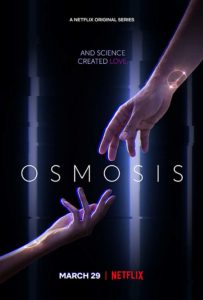Osmosis
Where is my soul mate?
 What should it take to find your soul mate? Go out looking for the dating applications or directly in the ballads? What if an artificial intelligence did it for you? This is the proposal of the series “Osmosis”, of French Netflix, which debuted last week.
What should it take to find your soul mate? Go out looking for the dating applications or directly in the ballads? What if an artificial intelligence did it for you? This is the proposal of the series “Osmosis”, of French Netflix, which debuted last week.
The plot takes place in a dystopian future, where violence and hunger do not seem to exist. Instead, people feel the need to relate, whether through a virtual dating environment or the long-awaited launch of a revolutionary product from the Osmosis company, which promises the immediate discovery of their soul mate.
To do this, the candidate must ingest a cocktail of nano-elements that will attach to the person’s brain, making it available to an artificial intelligence the discovery of the soul mate through a powerful search in social networks.
 The brains behind Osmosis are the siblings Esther (Agathe Bonitzer) and Paul Vanhove (Hugo Becker). The motivation for the discovery of the technology happened due to the fact that Paul and his mother are carriers of a degenerative brain disease, that leads to a deep coma and later to the death. Esther managed to bring her brother back to life by making an illegal implant, and they discovered that one of the side effects of brain stimulation was the discovery of the perfect pair.
The brains behind Osmosis are the siblings Esther (Agathe Bonitzer) and Paul Vanhove (Hugo Becker). The motivation for the discovery of the technology happened due to the fact that Paul and his mother are carriers of a degenerative brain disease, that leads to a deep coma and later to the death. Esther managed to bring her brother back to life by making an illegal implant, and they discovered that one of the side effects of brain stimulation was the discovery of the perfect pair.
In Paul’s case, the soul mate was Josephphine (Philypa Phoenix), who also accepted the implant, leading them to discover an unprecedented level of emotional and sexual relationship.
 The current moment is decisive, because Osmosis will conduct a test with a group of volunteers, before the final release of the product. There is great expectation from the press and the general public as this would be a totally different proposition than the virtual sex offered by a competing company.
The current moment is decisive, because Osmosis will conduct a test with a group of volunteers, before the final release of the product. There is great expectation from the press and the general public as this would be a totally different proposition than the virtual sex offered by a competing company.
But, anything is perfect. Despite the company’s success, Esther has her own agenda. Her greatest goal is to restore her mother’s memory by bringing her into a normal life. To do so, she will risk some unethical and even dangerous actions for some of the participants in the test group.
 Paul, on the other hand, also has his problems, since Joséphine simply disappears without leaving traces, suspecting that she has been kidnapped. An investment firm seems to have some involvement in this, whereas the Humanists, a radical group, tries at all costs to sabotage Osmosis.
Paul, on the other hand, also has his problems, since Joséphine simply disappears without leaving traces, suspecting that she has been kidnapped. An investment firm seems to have some involvement in this, whereas the Humanists, a radical group, tries at all costs to sabotage Osmosis.
Everyone acts according to their own convictions and goals, not always the most honest or ethical, and in the end it remains an issue: is it worth finding your soul mate if the difficulty of loving it is in yourself?
 As with movies, the European series surpasses its American counterparts not only by the most innovative themes, but also by the more daring approach. The cast has many beautiful faces, but without the exaggerated profusion of margarine commercial characters. The end of the series brings a closure for the season, but leaves open to various interpretations and a possible continuation.
As with movies, the European series surpasses its American counterparts not only by the most innovative themes, but also by the more daring approach. The cast has many beautiful faces, but without the exaggerated profusion of margarine commercial characters. The end of the series brings a closure for the season, but leaves open to various interpretations and a possible continuation.
The streaming giant Netflix is steadily advancing on the territory of the big movie and television studios, with films and innovative series that bring an unexpected freshness to the world of visual entertainment.
 This interesting series is provocative, bringing a critique about the hyperconnected world in which we live, and that often leads us to forget real and physical relations. We forget even that the next is usually very close to us. In time: there are some discreet scenes of nudity and affection between same-sex people, but nothing that offends the traditional family, even in these so medieval times we live now.
This interesting series is provocative, bringing a critique about the hyperconnected world in which we live, and that often leads us to forget real and physical relations. We forget even that the next is usually very close to us. In time: there are some discreet scenes of nudity and affection between same-sex people, but nothing that offends the traditional family, even in these so medieval times we live now.
The greatest virtue of “Osmosis” is to remember that not always what we crave is right or ethical, and that many unpleasant truths may be hidden under the mantle of good memories. Try it.






